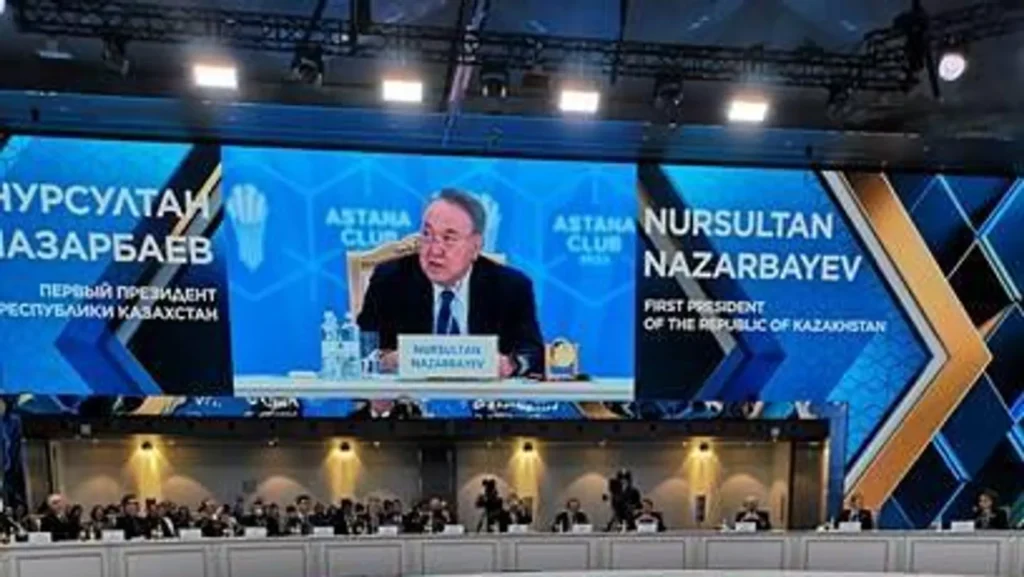Clash of Civilizations in Kazakhstan
ANALYSIS, 18 Dec 2023
Pepe Escobar | Sputnik – TRANSCEND Media Service
15 Dec 2023 – The Astana Club is now firmly established as an indispensable annual East-West gathering in the Heartland. This year’s forum, taking place at minus 32 degrees Celsius in the Kazakh capital, could not have been scheduled at a more incandescent geopolitical inflection point.
Several round tables set to examine the full spectrum of the “megacycle of turmoil” we’re all immersed in – generating massive challenges to an ever-integrating Eurasia, home to ¾ of the world’s population and over 60% of global GDP.
The Star Wars-style round table gathered a mix of assorted Atlanticists, mostly American and British, and Eurasia-wide specialists from China, Russia, India, Turkiye and Azerbaijan. Now let’s get straight into the action.
When it comes to “where are we now and where are we heading”, it was hard to bypass Western nonsense such as Russia acquiring lebensraum and the Thucydides Trap. Additionally, the table was not exactly reconciling the fact that amidst the whole “de-globalization” hype, Singapore remains so attractive to Western elites, when it remains a de facto autocracy.
The always entertaining Edward Luttwak, who advised and continues to advise everyone and his neighbor in the US Deep State, coined landmarks such as “turbo-capitalism”, imprinted the notion of geoeconomics, and raises cows in the Bolivian jungle, once again developed his Chinese obsession. He was adamant: the UN Security Council is a waste of time; “all the countries near China are anti-China” – which is demonstrably false; and “there’s no symmetry between US and China.”
When discussing “the world on the edge of the abyss”, Charles Kupchan from the Council on Foreign Relations, by videoconference, mused on the “strategic defeat” of Russia before calling for a “stop in the bloodshed” – when there were never such calls before the much-lauded, and botched, Ukrainian counteroffensive.
Zhao Long from the Shanghai Institute for International Studies preferred to focus on China’s “strategic patience”, a holistic approach – as well as China as one of the major victims of the proxy war in Ukraine. Zhao Huasheng of Fudan University added that a “doorstep war” only adds to “doorstep insecurity.”
On the threat of fragmentation of the world economy, Sergey Afontsev of the Russian Academy of Sciences stressed how Moscow re-structured foreign trade in less than 6 months, and how the whole mechanism of oil exports to India was put in place in only a few months.
A key thread in all discussions was the “securitization of everything” – and how this dangerous interdependency only exacerbates security risks. Evan Feigenbaum of the Carnegie Endowment for International Peace proposes that we are deep into a clash between economic integration and security fragmentation.
A Reality Check on Sanctions
 Pepe Escobar, born in Brazil, is a correspondent and editor-at-large at Asia Times and columnist for Consortium News and Strategic Culture in Moscow. Since the mid-1980s he’s lived and worked as a foreign correspondent in London, Paris, Milan, Los Angeles, Singapore, and Bangkok. He has extensively covered Pakistan, Afghanistan and Central Asia to China, Iran, Iraq and the wider Middle East. He is the author of Globalistan (2007), Red Zone Blues (2007), Obama Does Globalistan (2009), Empire of Chaos (2014) and 2030 (2015), all by Nimble Books. Pepe was contributing editor to The Empire and The Crescent and Tutto in Vendita in Italy and is also associated with the Paris-based European Academy of Geopolitics. When not on the road he lives between Paris and Bangkok.
Pepe Escobar, born in Brazil, is a correspondent and editor-at-large at Asia Times and columnist for Consortium News and Strategic Culture in Moscow. Since the mid-1980s he’s lived and worked as a foreign correspondent in London, Paris, Milan, Los Angeles, Singapore, and Bangkok. He has extensively covered Pakistan, Afghanistan and Central Asia to China, Iran, Iraq and the wider Middle East. He is the author of Globalistan (2007), Red Zone Blues (2007), Obama Does Globalistan (2009), Empire of Chaos (2014) and 2030 (2015), all by Nimble Books. Pepe was contributing editor to The Empire and The Crescent and Tutto in Vendita in Italy and is also associated with the Paris-based European Academy of Geopolitics. When not on the road he lives between Paris and Bangkok.
Tags: Astana Club, Conflict Analysis, Eurasia, Kazakhstan
DISCLAIMER: The statements, views and opinions expressed in pieces republished here are solely those of the authors and do not necessarily represent those of TMS. In accordance with title 17 U.S.C. section 107, this material is distributed without profit to those who have expressed a prior interest in receiving the included information for research and educational purposes. TMS has no affiliation whatsoever with the originator of this article nor is TMS endorsed or sponsored by the originator. “GO TO ORIGINAL” links are provided as a convenience to our readers and allow for verification of authenticity. However, as originating pages are often updated by their originating host sites, the versions posted may not match the versions our readers view when clicking the “GO TO ORIGINAL” links. This site contains copyrighted material the use of which has not always been specifically authorized by the copyright owner. We are making such material available in our efforts to advance understanding of environmental, political, human rights, economic, democracy, scientific, and social justice issues, etc. We believe this constitutes a ‘fair use’ of any such copyrighted material as provided for in section 107 of the US Copyright Law. In accordance with Title 17 U.S.C. Section 107, the material on this site is distributed without profit to those who have expressed a prior interest in receiving the included information for research and educational purposes. For more information go to: http://www.law.cornell.edu/uscode/17/107.shtml. If you wish to use copyrighted material from this site for purposes of your own that go beyond ‘fair use’, you must obtain permission from the copyright owner.
